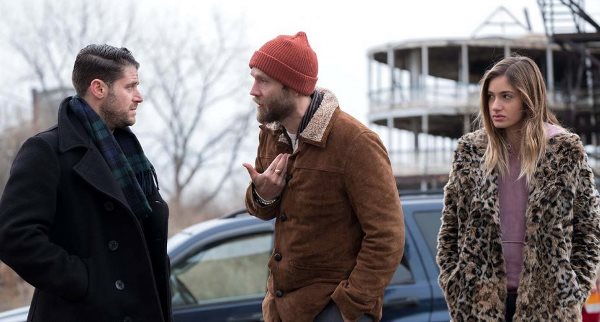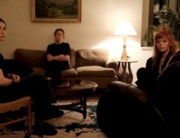
Clover takes place in bars, backrooms, seedy shacks, and, at one point, an abandoned train station. It begins, however, in an austere mansion, with the heads of wolves and sundry mounted on the walls, where Mr. Wiley (Ron Perlman) waxes philosophical about the nature of predators and prey before he orders a hit against some mobsters who have betrayed him. His purpose, he says, is to end chaos, and chaos is, of course, what ensues.
We cut to Mickey and Jackie Callaghan (Jon Abrahams and Mark Webber), two brothers who are in over their heads. Jackie’s gambling problem and the struggle to maintain their failing family-owned bar have landed them in debt to gangster mobster Tony (Chazz Palminteri). He offers them a chance to absolve themselves if they follow his son, Joey (Michael Godere), to collect from Barry (Sky Paley), who has failed to pay him, a task the brothers are in no way temperamentally prepared for. Barry ends up dead by Joey’s hand, and Joey ends up dead by the hand of Barry’s defiant young daughter, 13-year-old Clover (Nicole Elizabeth Berger). For the rest of the movie, Mickey, Jackie, and Clover are on the run, and by the end, the body count is high.
Director Jon Abrahams, who also plays Mickey, clearly aims to emulate Quentin Tarantino, Guy Ritchie, the Martin McDonough of In Bruges, and, perhaps, the Martin Scorsese of Goodfellas—crime films with an irreverent attitude to violence, with crackling dialogue and dark humor. Death is, for the most part, something that makes the characters mad but not sad in this world. Everyone has ulterior motives, and many will kill at the drop of a pin.
If Clover fails to join the company of the above films and filmmakers it’s because of its enormous lack of intelligence and variety. It’s only a small exaggeration to say that every conversation in Michael Testone’s incredibly verbose script involves the characters belittling one another, expressing their long history of being screwed over by the other person, or simply flexing, to the extent that no one is convincing, and almost all of them blend together. Clover, while ostensibly standing out only because of her age, is virtually indistinguishable from the rest because the script has given her nothing to do until the end, other than snap at everyone. Even a casual glance at Pulp Fiction, Snatch, In Bruges, or any number of films that successfully mix action and dark comedy will reveal more nuance or simply a wider array of dramatic tools.
Clover is best seen as a movie for middle school–age boys, and may very well satisfy a viewer with a hankering for action and a clipped pace or who simply wants to watch something mindlessly. To others, it will come across as the work of a director who sought to capture a certain style without really investigating what its masters did to make their films tick.






Leave A Comment